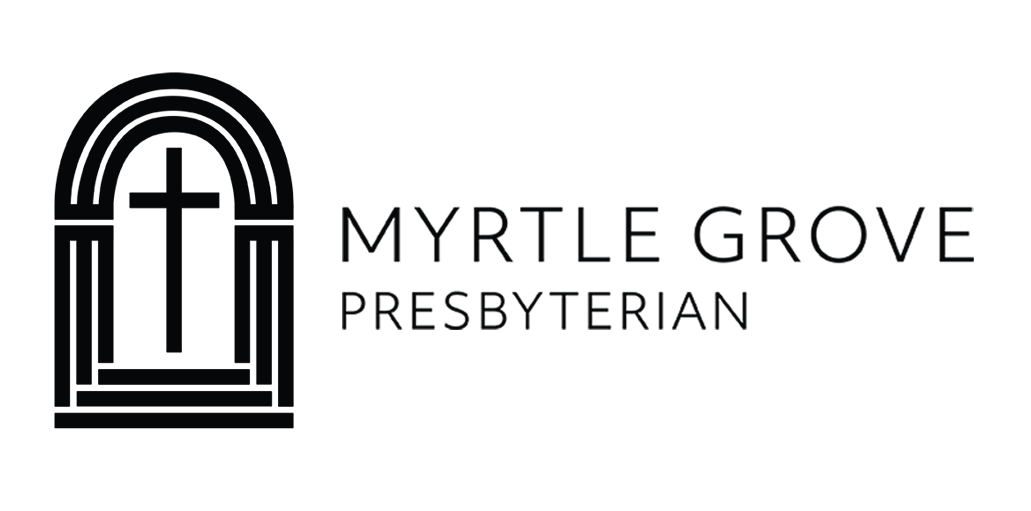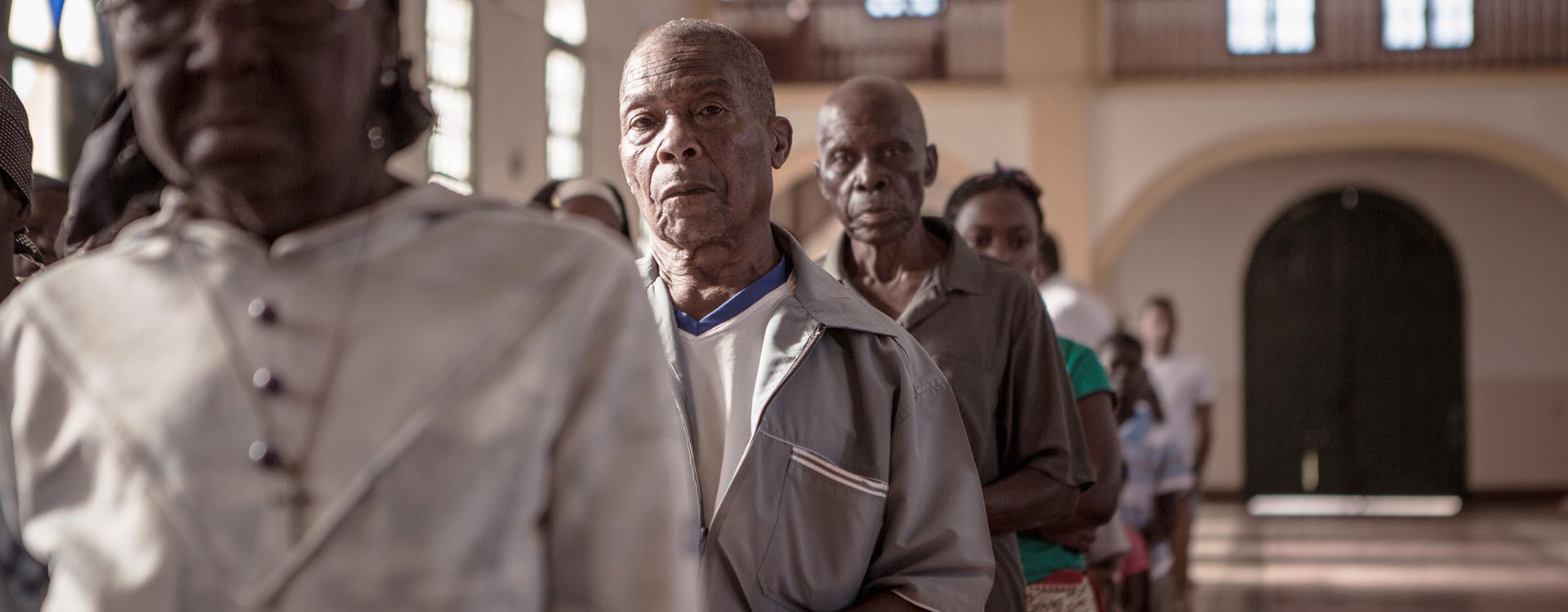WHAT IS STEPHEN MINISTRY?
Stephen Ministry offers a proven and effective way to organize, equip, and supervise a team of lay persons—called Stephen Ministers—to provide high-quality, one-to-one, Christ-centered, confidential care to people in the congregation and the community experiencing life difficulties.
Stephen Ministries is a not-for-profit Christian education organization founded in 1975 that produces training and resources known for their excellence, practicality, psychological integrity, and theological depth. These resources cover topics such as caring ministry, assertive relating, spiritual gifts discovery, grief support, spiritual growth, and more.
What Does the Stephen Ministry Logo Mean?
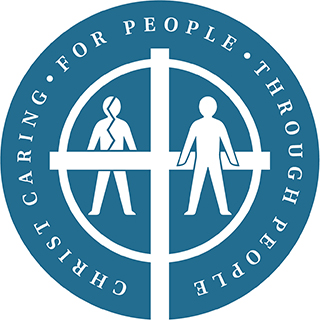
The broken person behind the cross symbolizes the brokenness in our lives due to our sin and imperfections. The whole person stands in front of the cross because it is only through the cross of Jesus that we are made whole. The circle symbolizes both the wholeness we receive through Christ and God’s unending love for us.
COMPLEMENTING OUR CONGREGATION’S MISSION
The mission of Myrtle Grove Presbyterian is to love God , love people , and make disciples . Stephen Ministry resources are used to strengthen and expand this mission.
Mission-Focused Actions Central to Stephen Ministry
- Equipping people to use their gifts in ministry
- Helping people grow in their faith
- Providing care and support for hurting people
- Building up the congregation as a caring community
- Reaching unchurched people with the love of Jesus
How Does Stephen Ministry Work?
Stephen Ministry is designed to function as a congregational or organizational ministry. Below are the main groups involved in Stephen Ministry and how they’re connected.
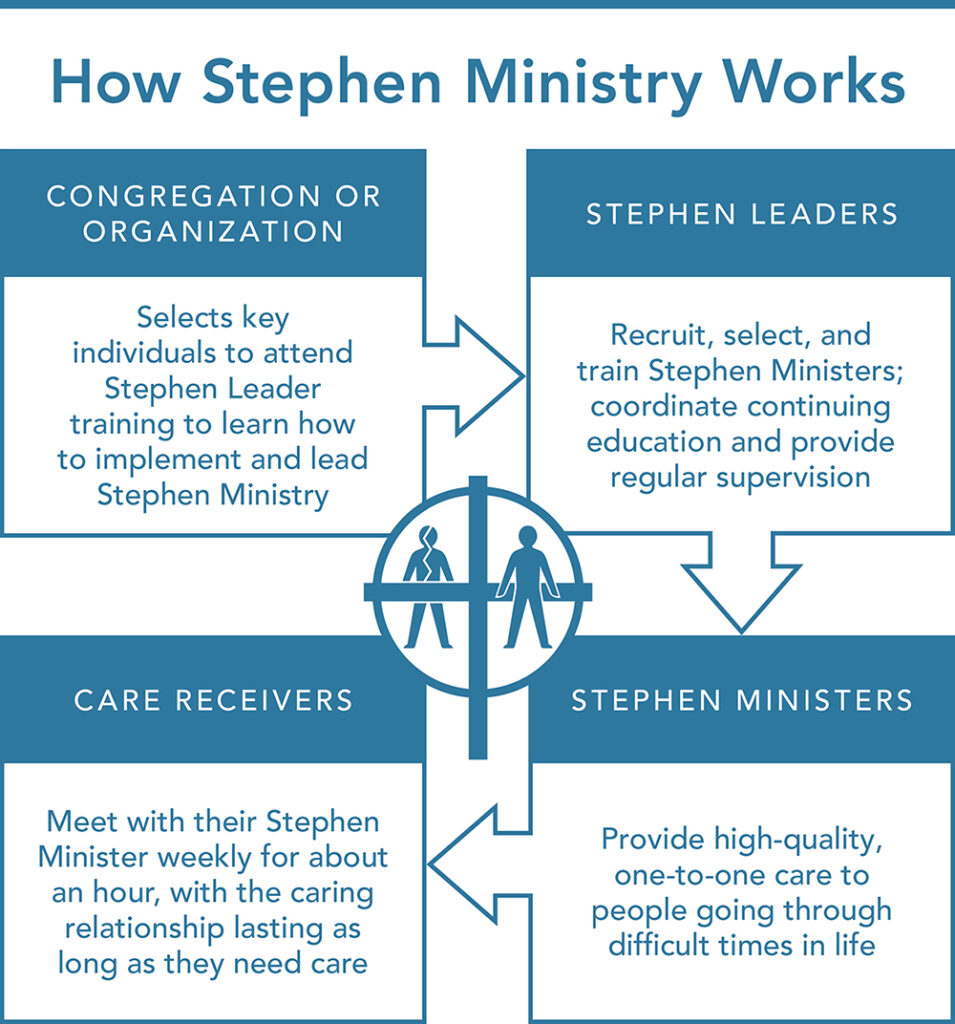
The Spectrum of Care
Stephen Ministry fills a crucial caring need, providing an additional layer of crisis care and ongoing care through a team of well-trained, well-supervised, reliable laypeople.
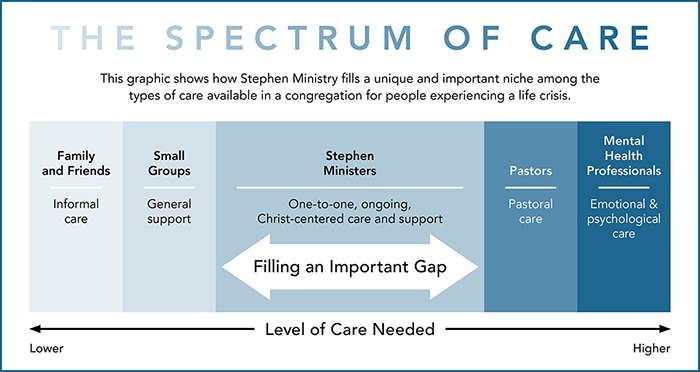
Q & A ABOUT STEPHEN MINISTRY
Who Is Involved?
Stephen Leaders are the ones who oversee and direct a Stephen Ministry. They recruit, select, train, organize, and supervise our Stephen Ministers; identify people in need of care; and match them with a Stephen Minister.
Stephen Ministers are lay caregivers. They have engaged in high-quality training in Christian caregiving, including topics such as listening, feelings, boundaries, and assertiveness.
Care receivers are the recipients of Stephen Ministers’ care. They are people from our church or community who are experiencing grief, loss of a job, divorce, loneliness, illness, or other life difficulties. Stephen Ministers meet with their care receivers once a week for about an hour for as long as the care receiver needs it.
What Do Stephen Ministers Do?
Stephen Ministers are caring Christians who listen, understand, accept, and pray for and with care receivers who are working through a difficult time in life.
Are Stephen Ministers Counselors?
Stephen Ministers are not counselors; they are trained lay caregivers. Their role is to listen and care, not to give advice. Stephen Ministers are also trained to recognize when a care receiver’s needs fall outside what they are equipped to provide—at which point they help connect the care receiver with the appropriate outside resource.
Why the Name Stephen?
The name Stephen comes from St. Stephen, who was the first layperson commissioned by the apostles to provide caring ministry to those in need (Acts 6).
Does the Pastor Still Have a Caregiving Role?
Pastors will always be the primary caregivers—and Stephen Ministry provides them with support in their caring ministry. God has called all of us, not just pastors, to minister to one another. Stephen Ministry multiplies ministry by equipping laypeople to provide care while pastors handle the caring needs they can best address.
Where Did It All Start?
Stephen Ministry has been around since 1975, when Kenneth Haugk, a pastor and clinical psychologist, began it to multiply the caregiving in his congregation in St. Louis, Missouri.
How Can Someone Receive Care from a Stephen Minister?
Stephen Leaders in each congregation coordinate referrals. If you or someone you know could benefit from the care of a Stephen Minister, you can talk to a Stephen Leader or a pastor. Stephen Ministers can help you through the process. (If you want to talk about Stephen Ministry for someone else, make sure you get his or her permission first.)
How Can I Become a Stephen Minister?
Begin by talking to a Stephen Leader or Stephen Minister. They can tell you more. New training classes take place approximately once a year.
STEPHEN MINISTER TRAINING TOPICS
- The Person of the Caregiver
- Feelings: Yours, Mine, Ours
- The Art of Listening
- Distinctively Christian Caring
- A Process Approach to Caring
- Assertiveness: Relating Gently and Firmly
- Maintaining Boundaries
- Crisis Theory and Practice
- Confidentiality
- Caring between Visits: Caregiving and Communications Technology
- Using Mental Health Professionals and other Community Resources
- Ministering to Those Experiencing Grief
- Caring for Those with Depression: The Stephen Minister’s Role
- Understanding Suicide: How to Help People Get the Care They Need
- Bringing the Caring Relationship to a Close
- Supervision: A Key to Quality Christian Care
- How to Make the First Caring Visit
- Go – God is With You!
- Ministering to Those Who Are Dying and Their Family and Friends
- Caring for People Experiencing a Medical Crisis
- Ministering to People Experiencing Challenges Related to Aging
- Ministering to People Needing Long-Term Care
- Ministering to Those Experiencing Divorce
- Crises Related to Starting or Adding to a Family
- Advanced Christian Caring
For More Information
Stephen Ministries’ 30-person staff is based in St. Louis, Missouri. For more information about Stephen Ministry, visit http://www.stephenministries.org or call (314) 428-2600.
- Call Myrtle Grove Presbyterian’s main office (910) 791-6179.
- Contact Stephen Ministries’ staff in in St. Louis, Missouri by visiting http://www.stephenministries.org or calling (314) 428-2600.
- What Is Stephen Ministry?
- Care Receivers Tell Their Stories (Videos)
